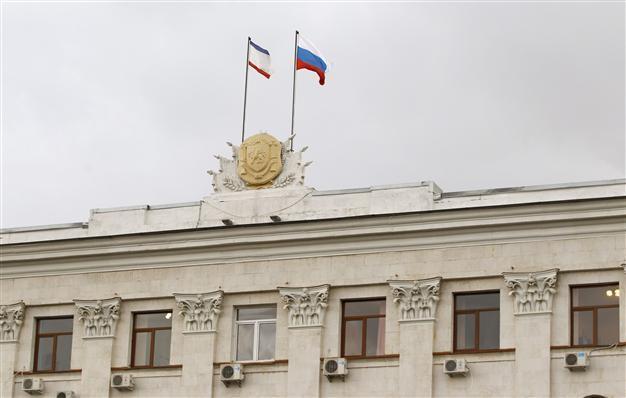Crimea votes to join Russia, setting referendum on March 16
MOSCOW

Russia's national flag and Crimea's regional flag are seen on a building of Council of ministers in Simferopol, March 5. REUTERS photo
Crimea's Parliament voted to join Russia on March 6 and its Moscow-backed government set a referendum within 10 days on the decision in a dramatic escalation of the crisis over the Ukrainian Black Sea peninsula.The sudden acceleration of moves to bring Crimea, which has an ethnic Russian majority and has effectively been seized by Russian forces, formally under Moscow's rule came as European Union leaders gathered for an emergency summit to find ways to pressure Russia to back down.
The Crimean parliament voted unanimously "to enter into the Russian Federation with the rights of a subject of the Russian Federation."
The Vice prime Minister of Crimea, home to Russia's Black Sea military base in Sevastopol, said a referendum on the status would take place on March 16. He said all state property would be "nationalised", the Russian rouble could be adopted and Ukrainian troops would be treated as occupiers and be forced to surrender or leave.
The announcement, which diplomats said could not have been made without Russian President Vladimir Putin's approval, raised the stakes in the most serious east-west confrontation since the end of the Cold War.
The new Ukrainian government has declared the referendum illegal and opened a criminal investigation against Crimean Prime Minister Sergei Askyonov, who was appointed in a closed session by the region's parliament last week. The Ukrainian government does not recognise his authority or that of the Parliament.
A Crimean Parliament official said voters will be asked two questions: should Crimea be part of the Russian Federation and should Crimea return to an earlier constitution (1992) that gave the region more autonomy?
"If there weren't constant threats from the current illegal Ukrainian authorities, maybe we would have taken a different path," Deputy Parliament Speaker Sergei Tsekov told reporters outside the parliament building in Crimea's main city of Simferopol.
"I think there was an annexation of Crimea by Ukraine, if we are going to call things by their name. Because of this mood and feeling we took the decision to join Russia. I think we will feel much more comfortable there."
Tension high
U.S. President Barack Obama took steps to punish those involved in threatening the sovereignty and territorial integrity of Ukraine, ordering the freezing of their U.S. assets and a ban on travel into the United States.
The U.S. Navy announced a guided-missile destroyer, the USS Truxton, was heading to the Black Sea in what it said was a long-planned training exercise and not a show of force.
TENSION HIGH
Russian Foreign Minister Sergei Lavrov, who had refused to meet his Ukrainian counterpart on MArch 6, had talks with U.S. Secretary of State John Kerry in Rome.
Earlier, Kerry also met his counterparts from Britain, Germany, Italy and France to discuss Ukraine and inform them of U.S. plans to sanction individuals and officials.
The White House said the order was "a flexible tool that will allow us to sanction those who are most directly involved in destabilising Ukraine, including the military intervention in Crimea, and does not preclude further steps should the situation deteriorate."
But the EU summit in Brussels seemed unlikely to adopt more than symbolic measures against Europe's biggest gas supplier, because neither industrial powerhouse Germany nor financial centre Britain is keen to start down that road.
The short, informal EU summit will mostly be dedicated to displaying support for Ukraine's new pro-Western government, represented by Prime Minister Arseny Yatsenyuk, who will attend even though Kiev is neither an EU member nor a recognised candidate for membership.
The European Commission has announced an aid package of up to 11 billion euros ($15 billion) for Ukraine over the next couple of years provided it reaches a deal with the International Monetary Fund, entailing painful reforms like ending gas subsidies.
Diplomats said that at most, the 28-nation EU would condemn Russia's so far bloodless seizure of the Black Sea province and suspend talks with Moscow on visa liberalisation and economic cooperation, while threatening further measures if Putin does not accept mediation efforts soon.
Putin has said Russia reserves the right to intervene militarily in other areas of Ukraine if Russian interests or the lives of Russians are in danger.
Dropping diplomatic niceties on March 6, the U.S. State Department published a "fact sheet" entitled "President Putin's Fiction: 10 False Claims about Ukraine."
"As Russia spins a false narrative to justify its illegal actions in Ukraine, the world has not seen such startling Russian fiction since Dostoyevsky wrote, 'The formula "two plus two equals five" is not without its attractions,'" the State Department said in the document.
















